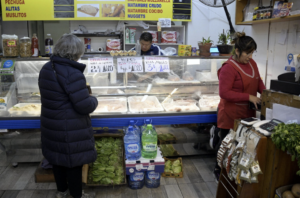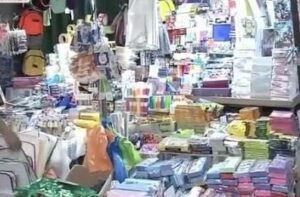
In Morón, a suburb of Buenos Aires, Argentina, shopkeepers like Paola Basso are grappling with the rapid escalation of prices following the election of libertarian Javier Milei. The adjustments these shopkeepers are forced to make, often in the form of frequently changing price tags, are a vivid testament to the nation’s soaring inflation rate, which has already reached an astounding 143 percent. This figure is expected to climb even higher as the government eases price controls on basic goods, a policy Milei is anticipated to completely abolish.
Paola’s experience in her grocery store paints a poignant picture of the challenges faced by ordinary Argentinians. She talks about the heartbreaking requests from customers to buy eggs individually, a situation that underscores the extreme financial pressure on the population. The grocer’s struggle is emblematic of the broader economic hardships plaguing Argentina.
The rapid inflation has led to a peculiar situation in local stores, where some products display up to four price tags, each superimposed over the last. This scenario is indicative of the dizzying pace at which prices are rising. Fernando Savore, vice president of the Buenos Aires grocers’ federation and Paola’s husband, describes the current times as “crazy,” noting significant price increases in essential items such as pasta and cleaning products.
The Looming Devaluation and Its Effects
With Milei’s entry into office, the market is bracing for even more turbulence. The economist Hernan Letcher anticipates that inflation will intensify next month due to market expectations of a significant devaluation of the peso under Milei’s administration. This expected devaluation, coupled with Milei’s stance against state intervention in the economy, is likely to exacerbate the already dire situation.
For years, the Argentine government has maintained strict control over the peso’s exchange rate, a policy that has been costly for the state. Milei’s proposed elimination of these controls signals a shift towards a free-market approach, which, while potentially beneficial in the long term, may lead to short-term economic instability.
The Human Cost of Inflation
The human aspect of this economic crisis is palpable in the stories of ordinary Argentinians. Mario Amor, a 70-year-old supermarket client in Morón, speaks to the difficulty of finding affordable options, often leaving stores with empty bags. Similarly, 60-year-old seamstress Clara Tedesco expresses her shock at the escalating cheese prices, highlighting the exhaustive process of comparing prices and making tough financial decisions.
In the Mataderos neighborhood, butchers have stopped writing down prices, as they change too frequently to keep up. Evelyn Garcia, a shop manager, notes that customers are more saddened than angry, understanding the inevitability of the situation. This sentiment reflects a broader sense of resignation and adaptation among Argentinians as they navigate the relentless inflation.
The impact on dietary habits is another stark indicator of the crisis. In a country famous for its beef, the sales of higher-quality cuts have declined in favor of lower-quality alternatives or cheaper pork chops. Evelyn’s observation that people have already altered their eating habits to keep meat on their plates underscores the depth of the economic impact on everyday life.
Looking Ahead
As Argentina faces one of the most severe inflation crises in its history, the resilience and adaptability of its people are being tested. The stories from Morón and Mataderos are microcosms of a nation struggling to adapt to rapidly changing economic circumstances. The upcoming administration change adds another layer of uncertainty, with the potential for both positive reforms and further economic challenges.





















Comments are closed for this article!